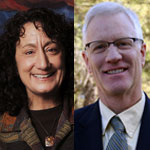 By Karen Pugliesi
By Karen Pugliesi
Vice Provost for Academic Affairs
and Daniel Kain
Vice Provost for Academic Personnel
We know faculty members work diligently at the start of each semester to make sure their courses are as effective as possible. In January, more than 200 faculty members from across campus gathered for a dialog about passion in teaching. Organized by the Teaching Academy and the Faculty Professional Development Program, Teaching Day 2014 served as a catalyst for sharing ideas and expertise about teaching.
The third annual Teaching Day featured John Pollard, a lecturer from the University of Arizona, who serves as director of General Chemistry. Dr. Pollard described a multiyear effort to redesign the University of Arizona courses in introductory chemistry so that students might experience deep learning. His project was not about leavening standard teaching practices with a few new techniques. Instead, Pollard described how he and his colleagues have focused the entire design process around one key question: What do students need to know about chemistry as novice learners?
According to Pollard, a standard introductory chemistry course is taught across the country through a traditional approach. His team shifted the course emphasis in several ways: from a wide breadth of content (covering lots of material) to an introductory course that aimed for depth of understanding; from disconnected facts to an integration of conceptual understanding of chemistry as principles in action; from memorization to reasoning that generates knowledge; and from abstract ideas to application of knowledge to issues in the “real” world. Their students explore environmental issues, life and medicine, materials design in everyday life and energy sources—all through the lens of chemistry. Students learn through addressing essential questions and through developing enduring understandings of phenomena, concepts and inquiry that they will bring with them to other courses.
Educators celebrate “teachable moments,” where students connect deeply with course material. Pollard encouraged the faculty to build entire courses around that principle. Engaging students in exploration, concept development and applications empowers them to be in charge of their own learning. Students who are agents of their learning are much less likely to feel bored and have the opportunity to create meaning that heightens relevance.
The session was a reminder both of how many innovative courses are in place at NAU and how dedicated our faculty members are to continuing their own learning.



